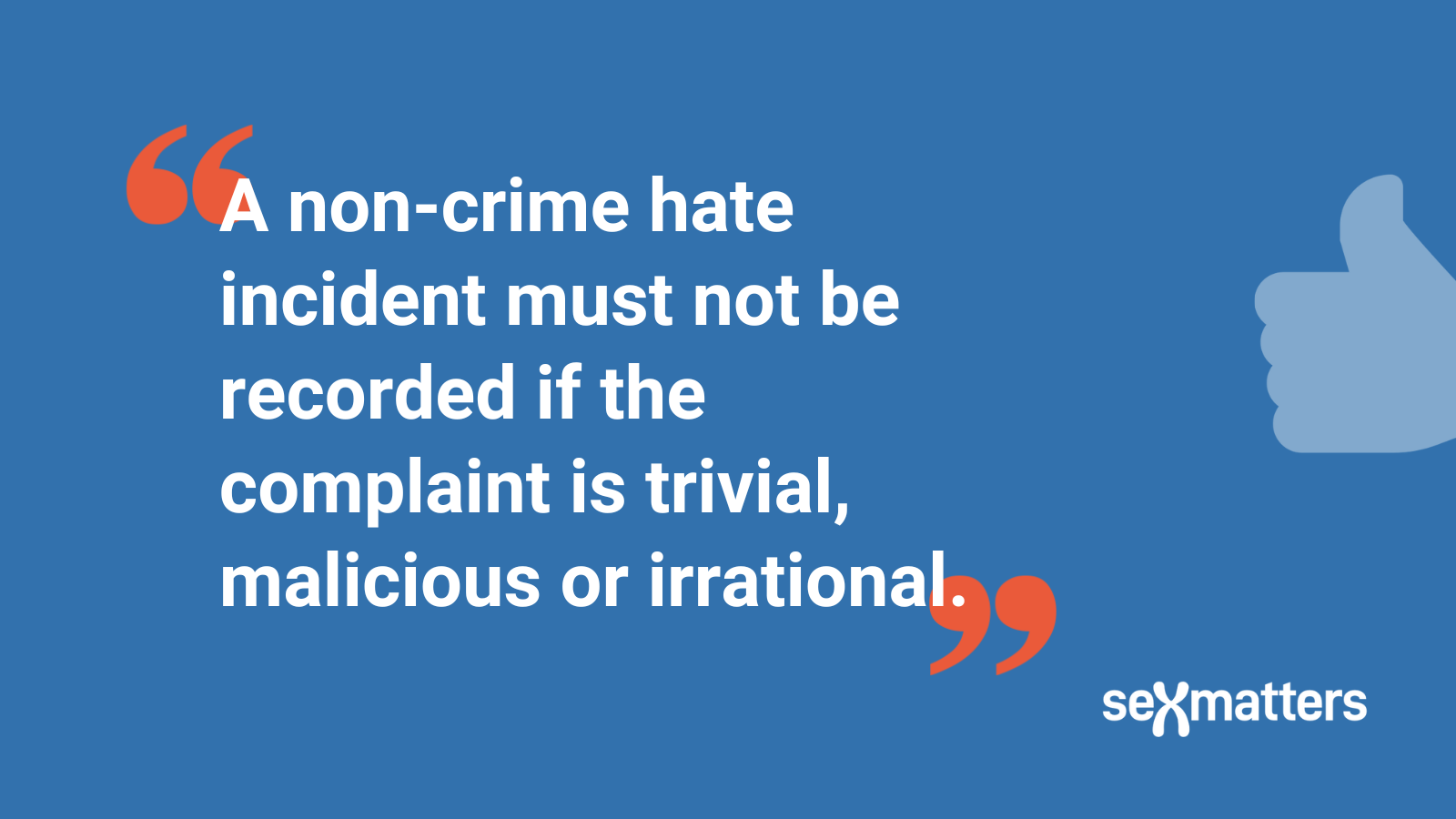New guidance on trivial, malicious and irrational complaints

The College of Policing has published new Authorised Professional Practice (APP) guidance on ‘Responding to hate’, which states that non-crime hate incidents (NCHIs) must not be recorded if the complaint is trivial, malicious or irrational.
This follows on from the Court of Appeal’s judgment in the case of Harry Miller v College of Police [2021], which concluded that the existing guidance on recording NCHIs was unlawful and needed additional safeguards to ensure that constraints on freedom of expression are “no more than is strictly necessary”.
The Police, Crime, Sentencing and Courts Act 2022 gave the Home Secretary the power to issue a statutory Code of Practice.
We were concerned that the College of Policing guidance was not as strong as the Statutory Code, and wrote to Chief Constable Andy Marsh QPM and Chair of the College of Policing Nick Herbert highlighting cases where people had faced police questioning, the recording of non-crime hate incidents, or prosecution because of reports of their gender-critical beliefs that should have been recognised immediately as irrational or malicious:
- Sarah Phillimore was reported for tweets including that her dog likes to eat cheese.
- Miranda Yardley, a transsexual, was prosecuted for a transgender hate crime.
- Caroline Farrow was reported to police after she referred in a tweet to the child of Mermaids CEO Susie Green, who was taken to Thailand at the age of 16 to have her own child “castrated and rendered sterile while still a child”.
- Linda Bellos OBE, an 80 year old woman, talked about self-defence.
- Venice Allan was prosecuted for broadcasting Bellos’s remarks.
- Kate Scottow prosecuted under s.127 of the Communications Act for tweets including calling a trans-identifed man a “pig in a wig”. The conviction was overturned on appeal almost two years after her arrest.
- Kellie-Jay Keen who has been questioned several times by the police.
- Jennifer Swayne was arrested by Gwent Police on suspicion of criminal damage and displaying threatening or abusive writing likely to cause harassment, alarm or distress after putting up posters saying “Three women are killed by men each week” and “Domestic violence kills”.
- Marion Millar was prosecuted for a hate-crime charge in Scotland, after posting stickers saying “Women Won’t Wheesht” and tweeting a picture of a purple, white and green suffragette ribbon tied to a wire fence which someone interpreted as a noose.
- Cathy Kirby, a Norfolk teacher, was visited twice at her Norwich home by police officers after transactivists lodged a series of complaints claiming her posts on Twitter were transphobic.
We also highlighted that some activists and lobby groups see all clear expressions of a trans person’s sex as hateful. For example, when the Equality and Human Rights Commission intervened in the case of Forstater v CGD [2021], more than 40 organisations, including Stonewall, signed a letter of complaint saying:
“It was a kick in the teeth to trans people to see the EHRC appear to put their organisational weight behind a movement that has only contributed to rising hate for trans people in communities, creating a policy environment where it is harder for trans people to access their rights.”
We are pleased to see that the final version of the guidance has improved from the consultation draft. It now includes examples that match those in the statutory Code of Practice , in particular this one, which is similar to the Miller case:
“On Twitter, an individual (the subject) expresses their belief that a person’s biological sex is more important than self-identified gender, and that biological sex should be prioritised when decisions are made about access to single-sex spaces. The tweet is not directed at any individual. However, another individual (the complainant) believes it to be transphobic and reports it to the police. The reviewing officer assesses that the perception of hostility is irrational – the expression of a view that conflicts with those of other people is not an indication of hostility without further evidence. The subject’s views are an example of a person exercising their freedom of expression to outline a personally held belief and a reasonable person would accept the discussion as a contribution to a lawful debate, even if they found it offensive or disagreed with it. An NCHI is not recorded, and the personal data of the subject is not recorded. The personal data of the subject (in the form of the subject’s twitter handle) that was initially recorded by the call taker is also removed from the policing system.”
In the version of the APP that was consulted on, a different example was given. That one talked about someone who complained about “anti-transgender posters” and another person with “philosophical faith around biological gender”. This vague perception-based assessment of hostility was exactly the approach that Humberside Police took in response to the complaints it got about Harry Miller. It reinforced the misconception that recognising and talking about basic facts about the two sexes is “anti-transgender” and “hateful”.
We are relieved that this example has been replaced with a clear, simple one. The College of Police’s guidance does not just affect the police who have to use it: it also affects the public’s perception of crime and of the acceptable limits to freedom of speech.
